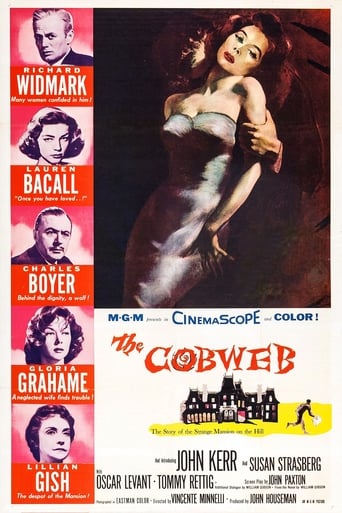barrymn1
The movie is so bloody serious and ridiculous that at least by 2018 eyes, I think it's a comedy. I laughed at all sorts of absurdities and overwrought situations in the film. Perhaps it was a serious drama back in 1955, but it's a hellava hoot now.I can't believe that anyone at MGM in 1955 ever green-lighted this absurd drama...and I'm surprised at the cast Minnelli was able to obtain. This is certainly one of the all-time camp classics of the 1950's.
meaninglessname
Richard Widmark. Gloria Grahame. Lauren Bacall. Sounds like a grade-A film noir or mystery. Not to mention Charles Boyer, Lillian Gish, Paul Stewart, Susan Strasberg and Oscar Levant. What could go wrong?How about an overlong talkfest where nothing much happens at a 50's- Hollywood style mental hospital that's more like a resort hotel for middle-class white folks who each have some minor tic they keep repeating over and over? And the key issue of the plot is which of three contending parties will get to choose the new drapes. Also a couple of suggestions of adultery that never reach fruition.The staff members as well all keep hitting the same note over and over in this tedious script. You begin to fell sorry for the cast, particularly poor Gloria Grahame as the clinic director's wife, required to keep throwing tantrums over nothing.There is a touch of mystery to the film. Why did MGM feel obliged to drag this slight material out to over two hours and film it in color and Cinemascope?
JohnHowardReid
Copyright 1955 by Loew's Inc. New York opening at Loew's State: 5 August 1955. U.S. release: 15 July 1955. U.K. release: February 1956. Australian release: 24 October 1955. 11,125 feet. 124 minutes.SYNOPSIS: Tensions among the staff at a private mental clinic reach a crisis.NOTES: Film debuts of John Kerr and Susan Strasberg. Negative cost: approximately $2½ million. Initial domestic rentals gross: approx. $1½ million.COMMENT: The most difficult type of role to accomplish successfully, is one in which a person conceals his or her true character under a false personality. Players cast in such roles, are faced with quite a problem. They must act convincingly enough to dupe their fellow- players, and yet unconvincingly enough to reveal their true characters to the audience. There are many examples of outstanding portrayals of this kind — Pierre Blanchar in "Symphony Pastoral", Gloria Grahame in "Human Desire", Mary Murphy in "Hell's Island", Edmond O'Brien in "The Barefoot Contessa" (for which he deservedly won an Academy Award). The latest example is admirably executed by one of the world's foremost actors, Charles Boyer, in "The Cobweb".Boyer provides a fascinating study of a once-brilliant psychiatrist, now a deteriorated man. Nominal head of a clinic for nervous disorders, he hides his gross inefficiency, his moral corruption, his cowardice, his deception and his cunning, beneath a bogus charm. Ironically, by too zealous an application to his work, his own mind has become so warped, that besides wrecking his own life and that of his wife, he now begins to wreck the lives of the people he seeks to assist.Secretary of the Clinic, is Victoria Inch, a vain, insolent, brawling, commandeering, middle-aged spinster, determined to be on the winning side of any quarrel. Interested solely in herself, she has no regard whatever for the feelings of other people, least of all the patients in her care. This role is superbly portrayed by veteran, Lillian Gish.Oscar Levant is excellent in his characterization of a patient who discourages others, in order to increase his own sense of importance. Newcomer, John Kerr, either lacks experience or natural acting ability. His performance may depend entirely on the work of ace director, Vincente Minnelli.Minnelli has a flair for satirical character-sketches. That's why he excels in his treatment of Miss Inch. Watch out for the scene in her home, between herself and Richard Widmark. Notice, also, the talkative bore who makes a nuisance of himself at the patients' meetings, the two ambulance men on the river-bank, the loutish types in the picture-theater, etc.The film's only defect is its rather pat conclusion. All the plots are nicely straightened out to the complete satisfaction of the box- office. Even Miss Inch's heart is touched. In spite of this one shortcoming, the picture is nevertheless quite absorbing and certainly well worth seeing.
robertguttman
As the great satirist Tom Leher once observed, "If people can't communicate then the very least that they should do is to shut up". "The Cobweb" is a perfect case in point. There's a tremendous amount of talk in this movie, but almost no communication. The plot revolves around the selection of new drapes for the library in a psychiatric hospital. However, it's the lack of communication in regard to that issue, and the complications ensuing therefrom, that form the crux of the story. Along the way it becomes clear that the staff are not all that much more well-adjusted than the inmates. They display a great deal of professional and personal jealousy, insecurity and frustration. But then, as the frustrated head of the Bullock household wisely observed in the classic screwball comedy film, "My Man Godfrey", "All you need to start an asylum is an empty room and the right kind of people." There are plenty of the right kind of people in "The Cobweb", among both the staff and the inmates.Directed by Vincent Minelli and featuring a first-rate cast (including one of the great stars of silent films, Lillian Gish), "The Cobweb" had all the elements to have become a really great movie. Nevertheless, somehow, it doesn't quite come off. Perhaps it's because the film is a little bit too talky. Perhaps the issue of which drapes to hang in the sanatorium library is a bit too minor and superficial to excite the viewer's attention. Nevertheless, if you haven't seen this one, give it a chance, it might just grab you.




